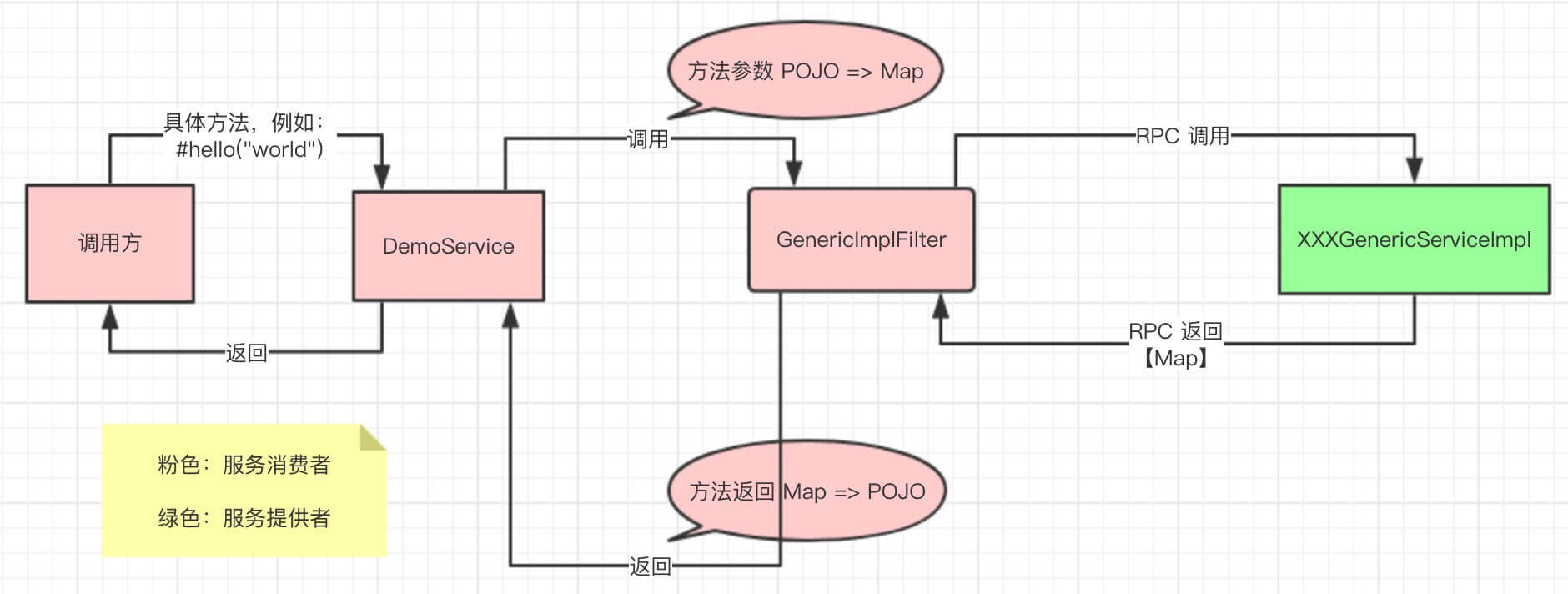1. Overview
This article shares the implementation of generalization. Let's take a look. User Guide - Generalized Implementation Definition:
Pan-interface implementations are mainly used when there is no API interface and model class elements on the server side. All POJO s in parameters and return values are represented by Map. They are usually used for framework integration. For example, a universal remote service Mock framework can be implemented to process all service requests through the implementation of GenericService interface.
Note that the consumer provider does not have API interfaces and model class elements. That is to say, Dubbo needs to do two things in the implementation of generalization:
Generalization implementations apply to service providers, and generalization references apply to service consumers, just the opposite.
- There is no API interface, so a generic service interface is provided. com.alibaba.dubbo.rpc.service.GenericService .
- A generalized implementation implements only one service.
- By implementing the $invoke(method, parameterTypes, args) method, all requests for the service are processed.
- Specific ways of use, we are in the ___________ "2. Examples" Medium-sized.
- There are no model class elements, so method parameters and method returns need to be transformed if POJO (e.g. User and Order, etc.):
- Service consumers, turn POJO into Map, and then invoke service providers. (Transparency)
- Service provider, return to Map.
- If the service consumer receives a return value of Map, it is converted to POJO and returned.
- (The Map here is just an example. In fact, we will see another way of conversion in the following section. (Transparency)
The overall process is as follows:

2. Examples
Service Provider
In dubbo-generic-service-demo-provider We provide examples. Let's pick the key points.
(1) Implementing GenericService interface in Java code:
|
(2) Implementation of Spring Configuration Declaration Service:
<bean id="demoService" class="com.alibaba.dubbo.demo.provider.DemoServiceImpl" /> <dubbo:service interface="com.alibaba.dubbo.demo.DemoService" ref="demoService" generic="true" /> |
- Interface Configuration Item to generalize the implemented service interface. With this configuration, service consumers can obtain the addresses of all providers of the service from the registry, including the addresses of the services implemented by generalization.
-
generic configuration item, default to false, does not use configuration item. There are currently two configuration item values that turn on the functionality of generalization implementations:
- generic=true, using com.alibaba.dubbo.common.utils.PojoUtils Implement POJO <=> Map interoperability.
- generic=bean, using com.alibaba.dubbo.common.beanutil.JavaBeanSerializeUtil Implement POJO <=> JavaBean Descriptor interoperability.
- There is no generic = native Java configuration item.
Service consumers
In dubbo-generic-service-demo-consumer We provide examples. Let's pick the key points.
The calling code is as follows:
|
- Just like our ordinary service consumers, invoking service providers, attention is exactly the same.
3. Generic ImplFilter for Service Consumers
com.alibaba.dubbo.rpc.filter.GenericImplFilter To implement the Filter interface, service consumers call the Filter in a generalized way. The code is as follows:
|
- Overall, there are some similarities to the GenericFilter of service providers.
- Using Dubbo SPI Adaptive mechanism, automatic loading, service consumers only, and generic configuration items.
- Line 126: Eliminate calls to generalize references, in the ____________ Perfect Dubbo Source Analysis: Generalized Reference to Call Characteristics (2) Detailed analysis.
- Line 129: If it's a normal call (a call with non-generic references), call the Invoker#invoke(invocation) method, continue the invocation of the filter chain, and finally invoke the Service service.
- (viii) Main Play (viii) Main Play (viii)
- Lines 14 to 16: Judgment is a call to a generalized implementation
- Lines 22 to 26: Get an array of parameter types.
- ========== [Step 1: Sequencing parameters]==========
- Lines 29 to 34: generic = bean, calling the JavaBeanSerializeUtil#serialize(JavaBeanDescriptor) method, serializing parameters, that is, method parameters => JavaBeanDescriptor.
- Lines 35 to 38: generic = true, call PojoUtils#generalize(Object[] objs Method, serialization parameter, only POJO => Map.
- ========== [Step 2: RPC calls]==========
- Line 41: The method to set RpcInvocation is called $invoke.
- Line 42: Set the method parameter type of RpcInvocation to GENERIC_PARAMETER_TYPES.
- Line 43: Set the parameter array of RpcInvocation to methodName types.
- Line 48: By setting up RpcInvocation as above, we can invoke the Invoker#invoke(invocation) method to enable RPC to invoke services implemented in generalization.
- ========== [Step 3: Deserialize normal results]==========
- Lines 55 to 69: generic = bean, calling the JavaBeanSerializeUtil serialize (JavaBeanDescriptor) method, and deserializing the result, that is, JavaBeanDescriptor => POJO.
- Lines 71 to 74: generic = true, call the PojoUtils # realization (pojo, type, genericType) method, and the result of deserialization is only Map => POJO.
- Note that after the deserialization, a new RpcResult is created.
- ========== [Step 3: Deserializing the Abnormal Results]==========
- Lines 87 to 100: Create the original exception targetException based on the GenericException exception.
- Lines 101 to 111: Set exception details to targetException.
- Line 113: Create a new exception RpcResult object.
- Lines 114 to 117: Creating the original exception failed, throwing an exception lastException.